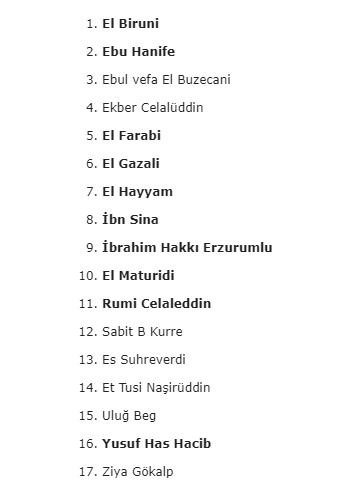Please click the links.
Turkish Thinkers in the Atlas of PhilosophyPhilosophy Atlas
- Al Biruni
- Abu Hanifa
- Abul Vefa El Buzecani
- Akbar Jalaluddin
- Al-Farabi
- Al Ghazali
- Al Khayyam
- Ibn Sina
- Ibrahim Hakki Erzurumlu
- al-Maturidi
- Rumi Celaleddin
- Fixed B Curre
- Es Suhrawardi
- Et Tusi Nasiruddin
- Ulugh Beg
- Yusuf Has Hacib
- Ziya Gokalp
- Suburb of El Biruni Kas /Birun 973, Rey 955 (?), Gilan 995, Kas 997, Bukhara, Jürcan 999, Harizm (Kas and Gürgenc) 1003, Ghazni 1017-1050, Kabul, Kashmir and most likely Thanesar’ via Punjab. Traveling to India (accompanying Mahmud of Ghazni’s campaigns of conquest) to BC: Universal genius, astronomer and geographer (hermeneutical) Indologist and philosopher.
- Abu Hanifa Kufa 699, Mecca, Baghdad (prison) 767: Islamic theologian (theologian) and legal scholar (faqih)
- Abul Vefa El Buzecani Buzecan 940 in Khorasan, Baghdad 959-998, Astronomer and mathematician (trigonometry)
- Vesic 870 in Al Farabi Farab, Merv, Baghdad, Harran 910 and Aleppo 942, Egypt and Istanbul (?), Damascus or Aleppo 950: The prominent figure of the philosophy understanding in Islam (metaphysics, epistemology, at the same time political scientist) with Hellenistic influences ), (after Aristotle) Second Master, Muallim-i Sani
- Al-Ghazali Tus 1058, Curjan and Nishapur, Baghdad 1085-95, Damascus, Jerusalem, Mecca and Medina, Tus 1097-1111; in between Nishapur1106-11: epistemology and philosophy critical Islamic theologian (mutakallim), jurist (faqih) and sufi mystic (mystic)
- El Harezmi Baghdad due to Kutrubbul (?) 780, 813-850 Baghdad. Astronomer and prominent Muslim mathematician. The person who recites Indian numerals.
- Al-Khayyam Nishapur 1050-1132, Samarkand 1070, Isfahan 1075 and Merv 1118. Free-spirited Islamic poet. Astronomer and mathematician.
- Efşene 980 of Ibn Sina Bukhara.Bukhara, Gürgenc 1003, Cürcan 1013, Reyy 1014, Hamadan 1015 and Isfahan 1023-37, Hamadan 1037: Muslim physician, medical textbook writer, judge/kadi and inspired by Hellenic culture in Islam most important figure of philosophy. It deeply influenced the Latin-speaking Middle Ages and New Age Persian philosophy.
- İbrahim Hakkı Erzurumlu Hasankale/Pasinler 1708 under Erzurum, Tillo/Aydinlar 1717-1780 under Siirt, between Erzurum and Mecca. Universal genius and mystic (reconciliation between scientific cosmology and the religion of Islam)
- El Maturidi Maturid 870 of Samarkand, 945 of Samarkand. Hanfi theologian, jurist and Qur’an commentator (interpreter), founder of Maturidiyya theology, which is named after him.
- Rumi Celaleddin Belh 1207, Samarkand 1212, Nishapur, Mecca, Malatya, Sivas, Akşehir 1219 and Larende of Karaman 1222 migrated to Konya 1228-1273. Great sufi poet (Persian) and mystic.
- Sait B Kurre Harran 836. Baghdad 901. Shaabi. Physician, astronomer and mathematician (numeral theory), Arabic translator of Hellenic texts.
- Es Suhreverdi Suhreverd 1154. Meraga and Isfahan. Greek/Anatolia, Aleppo 1183-1191. Şeyhül Üşrak (Master of Enlightenment), important sufi mystic and philosopher (Light Science, Hikmetül İşrak)
- Et Tusi Nashiruddin Tus 1201, Nishapur 1213-21, and Iraq (Mawsil/Mosul) Sertaht 1233 of Kermanshah, Meymundiz of Alamut (Ismailis fortress). 1245 and Qazvin 1256 in the Elburz Mountains. Baghdad (advisor of the Mongol conquerors) 1256, Meraga (observatory manager) 1259, Kazimeyn/Kazimiyye 1274 of Baghdad (remained in today): Universal genius, physician, legal scholar (faqih), mathematician and philosopher (faylesuf), Moral Doctrine (Ilmül Ahlak)
- Ulugh Beg is the grandson of Timur in Sultaniye 1394 in Zanjan, Samarkand 1409-1449. The highly educated monarch ordered the establishment of a university in 1420 and an observatory in 1425.
- Yusuf Has Hacib Balasagun and Kashgar 11th century. Poet and educator (ethics and medicine in the tradition of Ibn Sina), owner of the oldest work of Turkish-Islamic literature. (Celebrating Knowledge, Kutadgu Bilig)
- Ziya Gokalp Diyarbakir 1876. Istanbul and Thessaloniki. Istanbul 1913-18. Istanbul 1924. Writer and sociologist. One of the leading thinkers of modern Turkey.





















